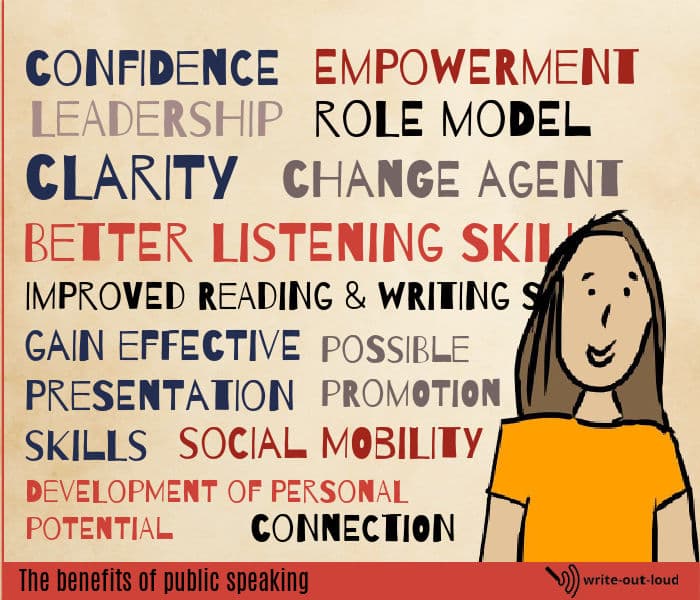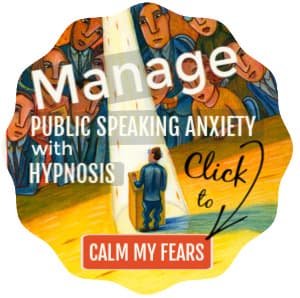- HOME ›
- Benefits of public speaking
The benefits of public speaking
14 excellent reasons to let go of fear of public speaking
By: Susan Dugdale
Tell me more!
I'm so glad you asked.
The benefits of public speaking are many.
So if you're one of the hordes of anxious "yet-to-be-convinced-I'd-rather-spend-time-at-the-dentist-getting-my-teeth-drilled-without-pain-relief" people, for your own sake, please read carefully.
There are 14 excellent reasons below to get rid of public speaking fear and get some public speaking skills.
To put it bluntly, you'll be able to do more for yourself, and for others, if you can speak up competently and confidently.
14 benefits of public speaking
When you learn to feel comfortable speaking publicly you will find you have:
1. More confidence
If the 'old you' suffered from doubt and anxiety, you'll find it gradually replaced by a new self image.
You'll see yourself standing tall, talking easily and communicating well in public settings.
You will feel empowered in your professional life as well as your personal life.
2. The ability to easily take on a leadership position in a group, or to readily talk for yourself
If you let others do your talking for you in the past or found it hard to express what you wanted to say, that will fade. Not only will you be able to fluently speak your mind but you'll find yourself doing it for others too.
Developing public speaking skills also develops leadership skills!
3. Become more definite
In other words, you'll no longer let real problems go saying "they don't matter" when what you really mean is you lack the confidence to state your case clearly in front of others.
4. Developed your listening, reading, writing and research skills
Preparing an effective speech involves:
- becoming a better listener
- considering the needs of your audience members
- developing critical thinking skills, as well as reading, writing and research skills
- exploring possible solutions and problem solving
- shaping your material to fit your speech purpose and your audience
5. Learned a lot of performance skills in order to make your speech more effective
You'll have become conscious of timing: when to pause and how long for.
You'll know about vocal variety: how and when to change the volume, speech rate, pitch and tone of your voice.
Your articulation will be clearer.
As you become more confident you'll know: how to use body language well, the most effective ways to use props or visual aids and how to meaningfully tell a story.
All of these are vital skills the best public speakers use to enhance their speeches.
6. Experienced the joy of breaking down cultural and social barriers
Because you'll know what to say, how to say it, why and when. (So important in today's world.)
7. The pleasure of motivating, inspiring or helping people to help themselves through personal development
You've become a change agent: a powerful conduit for spreading hope and encouragement.
8. Developed your vocabulary and general speech fluency
You'll know the effect of the words you choose to express your message and you'll also know they need to be different for different audiences to hear or receive them the way you want them to.
As well as having a flexible vocabulary, you'll no longer "um" and "ah" or use any of the fillers we commonly hear in everyday conversation indicating that the speaker may be unsure about what they're saying, or anxious about saying anything at all.
9. Become more conscious of your personal potential
Minus public speaking fear you will aim higher whereas before you may have settled for much less.
If you want to become a thought leader, a professional speaker, join the business world or to climb the corporate ladder, you can.
Learning to speak well in public is a great way to increase your chances of professional success.
10. Become more conscious of the impact your words have on others
You will know your words are powerful. You will be more careful about what you say, and how you say it, in your everyday life as well as when you make public speeches.
11. No fear of impromptu or spontaneous speaking challenges
When called upon to say a few words to a group of people at a moment's notice your heart will not pound with fear.
Instead you will take a deep breath. You'll graciously accept the great opportunity being given to you, speak fluently and deliver a good speech.
12. Increased your social network considerably
Putting yourself forward makes it easier for you to meet others. You'll find people want to talk to you: your spirit of "can-do" is attractive, energizing. You will draw people to you.
13. Become a role model for younger people
When you're seen competently and successfully speaking in public you become a powerful role model for people younger than yourself. Your example is inspiring.
14. Increased or opened up opportunities for career advancement
People who can communicate well are always wanted in any profession. It's a common part of numerous jobs.
There you have it: 14 compelling personal benefits! The importance of public speaking as an essential skill for living fully can not be overstated.
It truly is worth "feeling the fear and doing it anyway". Try it.
A note for teachers
If you teach oral communication skills, public speaking classes or a public speaking course the list could be useful for motivating your students.
It would make a good introduction to a course. You could offer it along the lines of:
"This is what you'll achieve: the gifts you'll give yourselves, when you swap public speaking anxiety for public speaking confidence".
References:
"Benefits of Public Speaking" by Lisa Schreiber and Morgan Hartranft, Millersville University, USA, LibreTexts, licensed under CC BY-NC-ND.
"Stand up, Speak out: The Practice and Ethics of Public Speaking, Why is Public Speaking Important" produced by the University of Minnesota Libraries Publishing through the eLearning Support Initiative.
- Return to the top of benefits of public speaking





